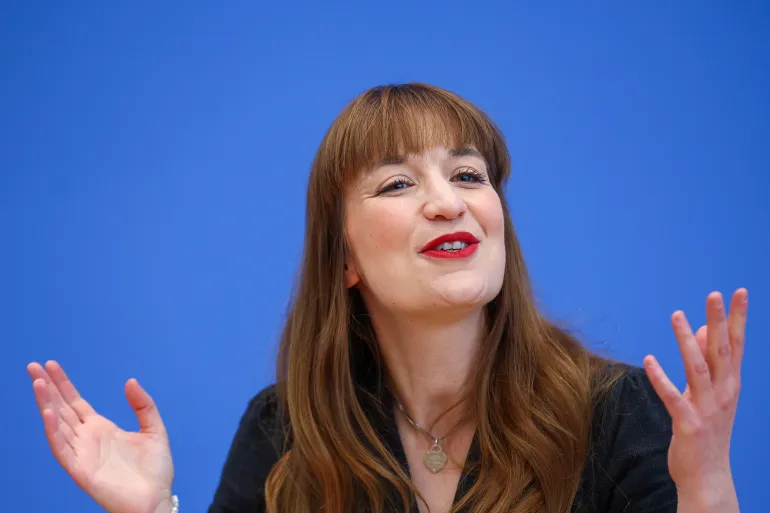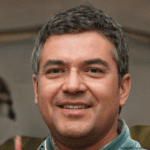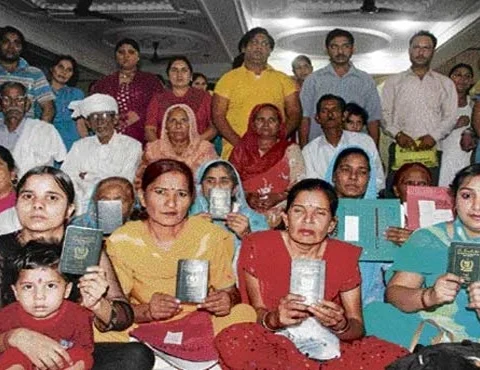As Germany approached its national election, Friedrich Merz—widely seen as the frontrunner for chancellor—sparked controversy by breaking a long-standing political rule. Traditionally, all major parties avoided collaboration with the far-right Alternative for Germany (AfD), but Merz backed a stricter migration policy with their support.
This decision came after two deadly attacks, reportedly carried out by asylum seekers, intensified public debate on immigration. However, despite his efforts, the proposed legislation was ultimately blocked, and Merz faced widespread criticism, including from former Chancellor Angela Merkel, a fellow Christian Democratic Union (CDU) member.
Backlash and Political Fallout
The backlash was immediate. In a heated Bundestag session, Left Party (Die Linke) co-leader Heidi Reichinnek condemned Merz, calling out his decision to work with “right-wing extremists.”
“All of this just two days after commemorating the victims of Auschwitz,” Reichinnek said, her speech resonating deeply both in Parliament and online.
Her passionate address went viral on TikTok, amassing over seven million views. It propelled her into the national spotlight, shifting attention to Die Linke’s progressive platform and her outspoken stance on social justice and equality.
A Surge in Support for Die Linke
As the election neared, Reichinnek doubled down on her progressive message. She actively engaged young voters through social media, collaborated with well-known influencers, and emphasized issues like rising housing costs and far-right extremism.
Her strategy worked. In the February 23 election, Die Linke secured 9% of the vote—more than double its previous result in 2021. A quarter of young voters backed the party, making it the top choice in that demographic.
Reichinnek hailed the result as a victory for social justice and democracy. “This is just the beginning,” she told Al Jazeera. “The cost of living crisis, growing inequality, and the far-right threat aren’t over. We will continue to be a strong voice in Parliament and on the streets.”
Reichinnek’s Rise: From Activism to Leadership
Born in Saxony-Anhalt in 1988, Reichinnek grew up in East Germany and developed an early interest in social justice. She studied Middle Eastern Studies and Political Science, spending time in Cairo during the Arab Spring, which deeply influenced her political outlook.
Before entering politics, she worked in the social sector, including teaching German to refugees. Joining Die Linke in 2015, she quickly climbed the ranks, becoming the youngest state chairwoman in Lower Saxony by 2019. Two years later, she won a Bundestag seat, focusing on pensions, youth, and family policies.
Political scientist Stefan Marschall noted, “Her background in East Germany’s working class gives her authenticity. She’s not from a privileged position, which resonates with voters.”
Die Linke’s Comeback Amid Party Turmoil
Just a year ago, Die Linke’s future looked bleak. Internal divisions over immigration and foreign policy led to the departure of high-profile leader Sahra Wagenknecht, who formed her own party. With poor results in the European and regional elections, many thought Die Linke was finished.
But Reichinnek and her team turned things around, tapping into youth concerns and reclaiming a strong left-wing identity. “She effectively challenged the AfD’s dominance on social media,” said Die Linke member Moheb Shafaqyar. “At a time when many young people are moving towards the right, this election showed a reversal.”
Looking Ahead: A Stronger Left in Germany?
Reichinnek’s approach—combining social media savvy with grassroots activism—has reshaped Die Linke’s public image. Political analyst Oezguer Oezvatan believes her success is rooted in timing and clarity of vision. “After Wagenknecht left, the party embraced a more progressive stance, particularly on immigration and human rights.”
But challenges remain. With Germany facing economic uncertainty and a strengthened far-right, Die Linke will need to build on this momentum. “Reichinnek is a key driving force behind this resurgence,” Marschall said. “But the real test will be maintaining this energy beyond the election.”
For supporters like Lina Mueller, a 34-year-old social worker, Reichinnek represents the party’s new generation. “She stands for social justice without trying to win over AfD voters. She feels authentic, and that matters.”
As the political landscape in Germany continues to shift, one thing is clear—Heidi Reichinnek has emerged as a powerful voice for the country’s left, and she’s not backing down.







